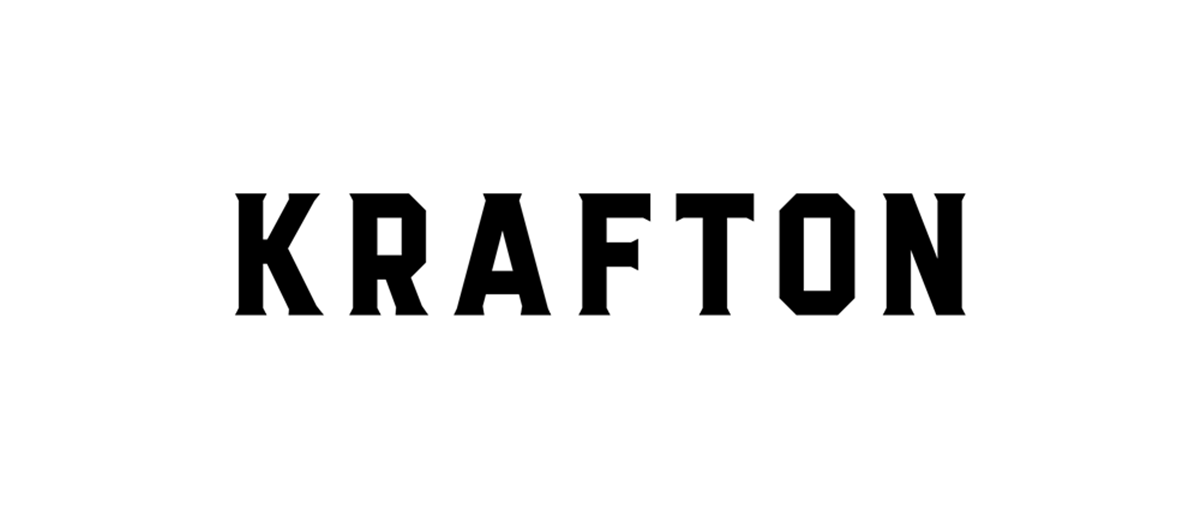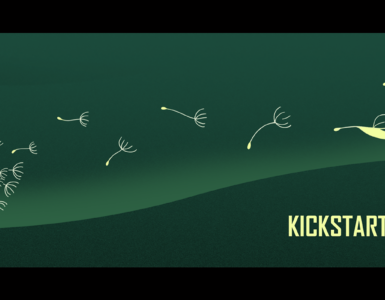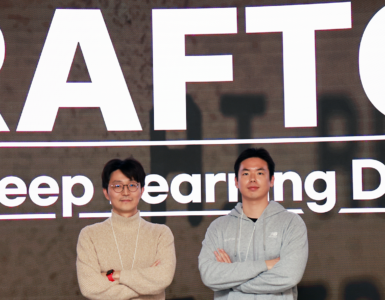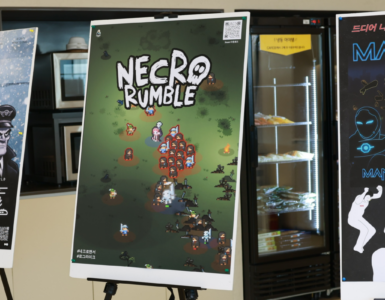An interview with the translators of PUBG STUDIOS Translation Dept.
Communication is the basis of all in the corporate world. Anyone who has ever worked with others will soon realize how important good communication is and how difficult it can be. KRAFTON, which has been working with developers from all over the world since the early days of the development of “PUBG: BATTLEGROUNDS,” operates professional translation organizations so that members can communicate beyond borders for their projects. We asked Angela Won, Kyeongho Lee, and Dongmin Kim from the Translation Dept. of PUBG STUDIOS about how they work to help developers communicate one another.
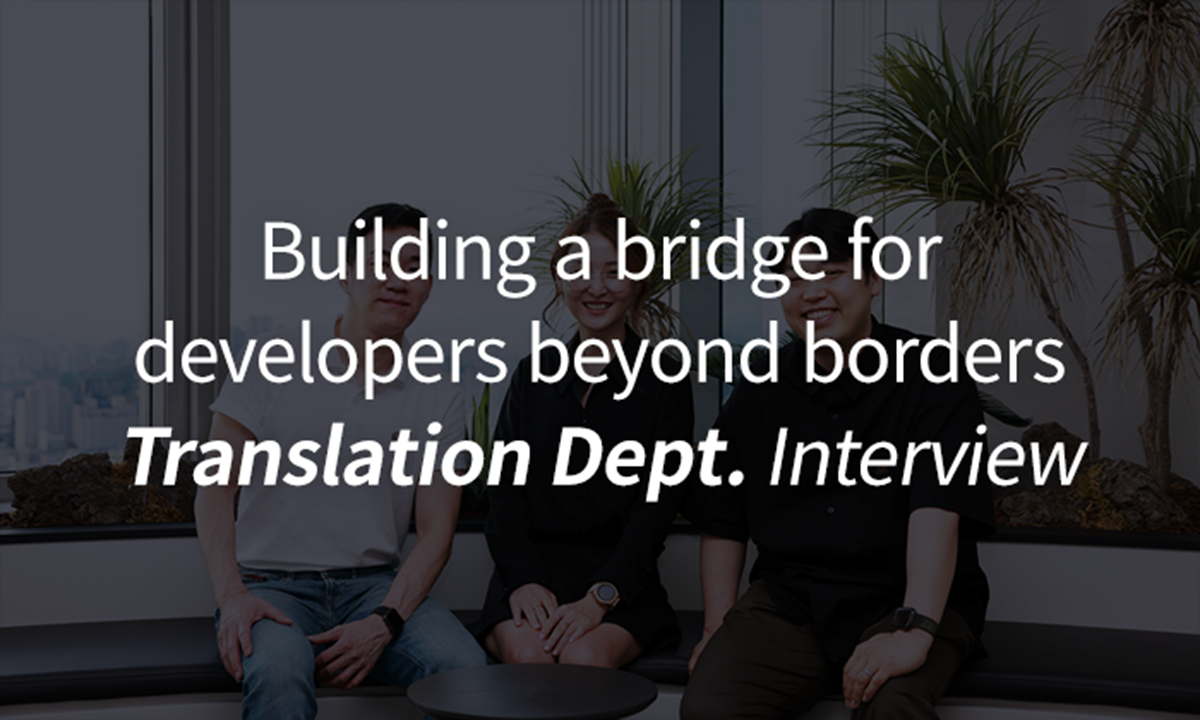
Please introduce yourself to readers.
Angela Won (Angela): Hi, I’m Angela Won, the leader of Translation1 Team at PUBG STUDIOS Translation Dept.
Dongmin Kim (Dongmin): Hi! My name is Dongmin Kim. I’m an interpreter at PUBG STUDIOS Translation Dept.
Kyeongho Lee (Kyeongho): Hi, I’m Kyeongho Lee, a translator at PUBG STUDIOS Translation Dept.

Please tell us what motivated you to become an interpreter/a translator.
Angela: I found it fascinating to help people who speak different languages to be able to communicate with each other. I also enjoy challenging myself to find the most effective way to interpret a speaker’s message.
Kyeongho: I enjoyed computer games when I was very young, but there were few foreign games localized in Korean at the time. I had to study English to play those games as much as I wanted, which encouraged me to get deeply interested in English. I used to hear from friends and teachers that I was good at English and studying a language was not something boring to me. So, I majored in English Literature and went further up to a graduate school for interpretation and translation to be a better professional. After graduation, I have been working as a translator to this day.
Dongmin: I wanted to try something new. I’ve decided to quit my job and study at the graduate school of interpretation and translation after seven years of career in my first job. At the time, all my friends and family told me to rethink my decision, but I had already made up my mind. I really enjoy working as an interpreter. I’ve never regretted my decision.
As an interpreter/a translator, you could have chosen to work as a freelancer, or there must have been another career path to various industries among other in-house translation organizations. Are there any specific reasons you chose KRAFTON/PUBG STUDIOS?
Kyeongho: As I mentioned earlier, I really like playing games and I have been interested in the technology and IT sectors. I tried to find my job at the companies in these sectors and naturally came to join PUBG STUDIOS.
Dongmin: I previously worked at companies that had very strict rules. So, for my next job, I wanted to work in the IT or game industry which offer a more casual working environment. PUBG STUDIOS Translation Dept. is the place to be!

At KRAFTON, we have dedicated organizations including Executive Translator Team and PM Translator Team consisted of Japanese, Chinese, and English translators supporting global communication in various areas. What do you think are the advantages of working in such a global environment?
Dongmin: Not many companies have a team of interpreters and translators. They usually have one or two interpreters and translators. It’s great to work in a team that has in-depth knowledge of the interpretation and translation protocol. KRAFTON and PUBG STUDIOS have many interpretation and translation teams that offer expertise in different languages and fields. One of the benefits of having a big team is that you get to work as a pair in simultaneous interpretation. This allows interpreters to offer a better quality for listeners.
Angela: We have a team of translators who specialize in written translation, and I learn a lot from referencing their work. Not only I learn a lot from looking at their translated work, but just knowing there are translators who work with me is a big energy booster.
Kyeongho: Unlike working as a freelancer, working at an in-house translation team makes me feel a sense of belonging a lot. Based on this, the general direction for my tasks is helping our product to achieve a better success rather than focusing on each text too much. Just like the other teams in PUBG STUDIOS, one of the main goals of Translation Dept. is to help our product to be successful.
Tell us your daily work routine as an interpreter/a translator.
Angela: As a team leader, I do both managing and translation work. I constantly check if there are new requests from overseas offices and other translation teams at KRAFTON. I’m also responsible for managing schedule and assigning work to my team members.
Dongmin: As we regularly work with overseas studios, we often receive urgent requests at the last minute. Also, meetings are frequently canceled as well. So, the first thing I do in the morning is to check my daily schedule. And I translate documents and review meeting agendas when I have some time between meetings.
Kyeongho: Before getting into work at the office in the morning, I have breakfast at the cafeteria first. (laugh) I also check whether there is any new translation request when arriving at my desk. Like many other teams in PUBG STUDIOS, Translation Dept. also uses JIRA as a project management program. The translation requests through emails are automatically posted on our JIRA board, and I double-check if there is anything missing. I review the translation done by the automatic machine translation solution used in our messenger and translate various documents in different formats including JIRA tickets.

Since the content that developers communicate at PUBG STUDIOS is mainly a specialized field, I think there are many things to study or prepare for interpretation/translation.
Dongmin: Working at PUBG STUDIOS does not mean that you are good at playing PUBG: BATTLEGROUNDS. (Laughs) But I always check the latest updates to be familiar with new features. Some members in PUBG STUDIOS are quite famous and you can find their videos on YouTube. And there are recorded versions of the meetings in the PUBG STUDIOS archive as well. I often watch those videos before the meeting to become familiar with the speaker.
Kyeongho: If a speaker is important in interpretation, I think a goal of a document is important in translation. For example, I translate a patch note in a light tone as its source is light and witty while trying to deliver accurate information when it comes to JIRA documents as the information here should be precisely shared to other teams for a successful project. Therefore, I should understand the goal of each document and refer to the previous documents a lot.
Of course, I also need to play the game related to the text I translate. This is an essential part for me to understand the terms and details written by developers. That’s why I often participate in the “Playday,” the company-wide event in which PUBG STUDIOS members play our game together. I am almost always killed in the early game as I’m not a veteran player at all, though. (Laughs)
Angela: When I am working as an interpreter, different people expect different style of interpretation. Some want me to interpret everything from word to word and some who understand more English will want me to interpret mostly on important information. It is necessary for me to understand different needs and provide different styles of interpretation. Furthermore, I spend a lot of my own time to study as I need to support developers to communicate with each other.
When interpreting and translating the conversations of “game experts,” there may be times you think, “I wish I could play the game better.”
Dongmin: Absolutely! I remember interpreting for a gunplay meeting. The discussions were about ammo’s velocity, trajectory, and recoil. It would have been easier for me to interpret if I were a skilled sniper.
Angela: I was never a gamer while growing up, so at first, it was difficult to get used to hearing different games and related words in meetings. Developers are all familiar with games, so they casually mention different games in conversation, and it was difficult for me to follow or catch their nuance. This pushed me to study very hard. (Smiles)
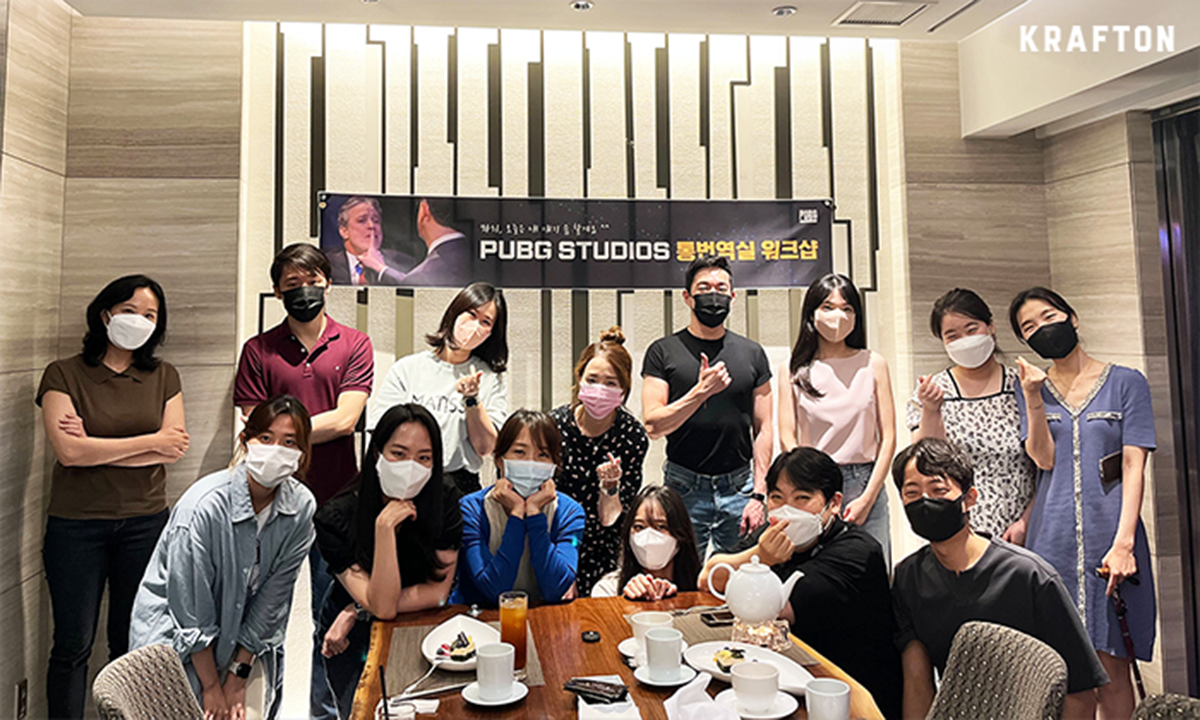
What do you think that your experience in the Translation Dept. at PUBG STUDIOS will benefit your career as an interpreter/a translator?
Kyeongho: As a translator who wants to work in the IT sector, it is the biggest advantage for me to be able to experience various development processes widely and deeply. Anyone interested in the IT sector would think it is very attractive to be able to look into various areas of development including anti-cheat, art, coding, etc. in detail.
Dongmin: We use a lot of interpretation tools to work with overseas offices and partners. We’ve also set up a system to work remotely in case we are unable to come to the office. Having the opportunity to try different interpretation tools and devices has a lot of benefits for interpreters as they are able to adapt very quickly to any kind of setting. In addition, PUBG STUDIOS boasts a state-of-the-art interpretation booth that is hard to find elsewhere.
Angela: I mostly support developers, but my work requires me to study a wide range of topics, and this is becoming a huge asset in my career. For example, when interpreting about the PUBG Universe, I need to know about the game and history, and when interpreting about Unreal Engine, I need to study tech. As I need to study so many topics, it pushes me to grow. One day, while talking to my colleagues, I said, “If you work here for a long time, you will be able to do well wherever you go,” and they said, why go elsewhere when this is the best place to be? (Laughs).

What do you think that your experience in the Translation Dept. at PUBG STUDIOS will benefit your career as an interpreter/a translator?
Dongmin: There are times when abbreviations and acronyms are used during the meeting and interpreters don’t know what they stand for. In my first meeting at PUBG STUDIOS, one of the participants used the word “Keema”. It took me some time to understand that “Keema” stands for keyboard and mouse.
Angela: Before the pandemic, there were a lot of consecutive interpretations compared to now, so there were a lot of times where an interpreter was in the same conference room. Knowing that there are many people in our company who speak English well, I was a little nervous to see everyone staring at me when I was interpreting. (Laughs) Of course, I got used to the situation like this over time, and since the last two years during the pandemic, many meetings have been moved from offline to online. With the help of communication tools and systems, many meetings are now supported with simultaneous interpretation.
I believe there’s a separate team in charge of localization (L10N) at PUBG STUDIOS, and they also do translation as well. What’s the difference between translation being done in Translation Dept. and L10N work being done in the localization team?
Kyeongho: As developers use different languages, Translation Dept. provides them with interpretation and translation support to help them communicate with others for their tasks. In this process, we also explain what a term or feature is if its meaning should be clearly delivered. L10N manages the terms and expressions released to the public and makes a final call on how they should be translated. Two groups work together in some cases. Once translators translate a source text into a target text trying to keep its original intent as much as possible and hand it over to L10N, L10N focuses on what should appeal to the public more and makes some changes.
We have a lot of teams working in cross-cultural communication environment here at KRAFTON/PUBG STUDIOS. Many people we’ve met during the interviews were so grateful for the strong support from interpreters/translators. Do you have any direct experiences for this?
Dongmin: Some attendees of the meeting always mention the names of interpreters as they wrap up. It feels great to be recognized as a participant of the meeting.
Kyeongho: Once in a month, PUBG STUDIOS holds the “All-Hands Meeting” to encourage communication among teams and share information. In this meeting or any other one, some developers say they are able to work well thanks to the help from translators. That’s when I feel rewarded.
Angela: There are many people who are fluent in English and don’t need interpretation support in our company. And in a way, we are doing our job, and people could take what we do for granted, but I think many are grateful for what we do. Some people say that without our translators, we can’t communicate and make a game, and we are an important part of PUBG STUDIOS’ development. These words are very encouraging.
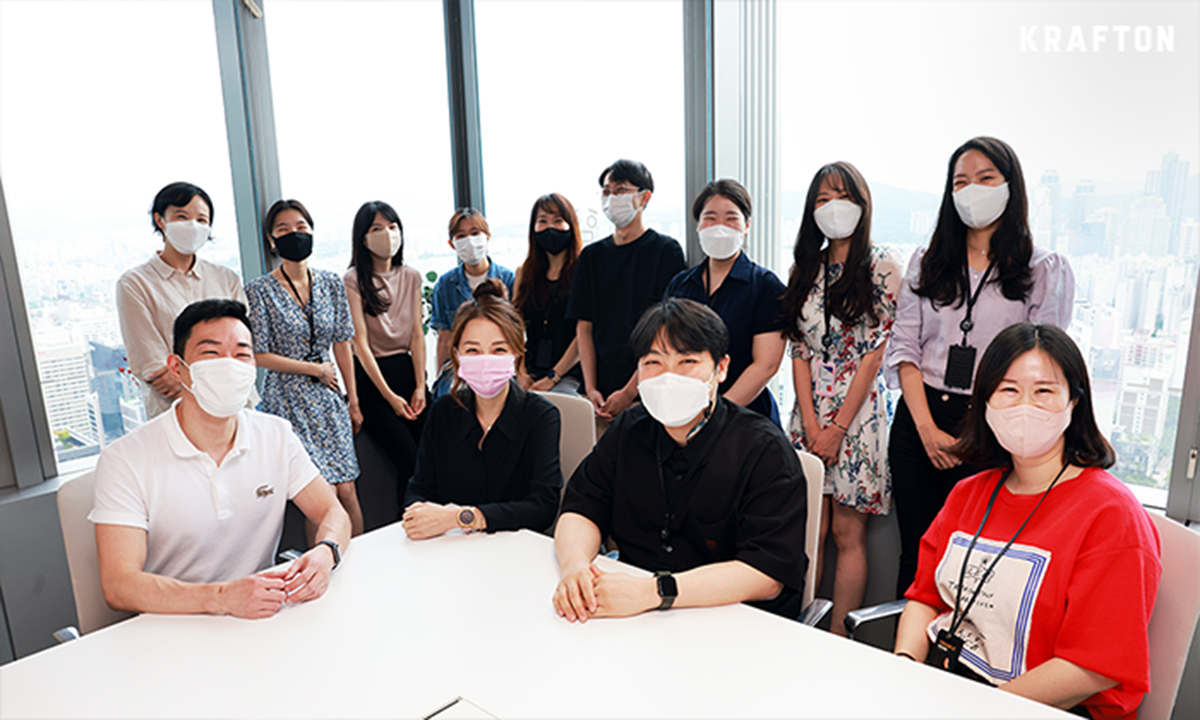
Do you have specific goals to achieve as an interpreter/translator?
Kyeongho: I got a similar question when I just joined PUBG STUDIOS, and my answer has not changed much since then. I want to be a translator who can understand and translate a text better than anyone else no matter what text I am on.
Dongmin: Machine translation has made remarkable improvements, but I still think human translators do a lot better. My goal would be to continue to excel machine translation until I finally retire. (Laughs)
Angela: As an interpreter, you are not only translating words, but also nuances, intentions, and emotions. I want to become an interpreter who conveys even the emotion and context of words. This is why I continue to learn and study.
Dongmin: Oh Angela! That’s cheating! (Laughs) All this time, Kyeongho and I have been talking about not losing our job to machine translation. (Laughs)
Last question. What does translation mean to you all?
Dongmin: Interpreters usually have the least level of knowledge in the specific topic discussed in the meeting compared to other experts. However, this should not prevent the interpreter from relaying messages simultaneously in two languages seamlessly. This requires in-depth and constant preparation before every meeting.
Kyeongho: Translation is an interesting game that has no ending for me. It is fun, but it does not feel completed even after it’s done. Whenever I read my previous translations again, I want to change something, and I feel like a better translation could have been done.
Angela: I think the work we do at PUBG STUDIOS Translation Dept., which helps developers to communicate what they think and believe, is like “magic.”

